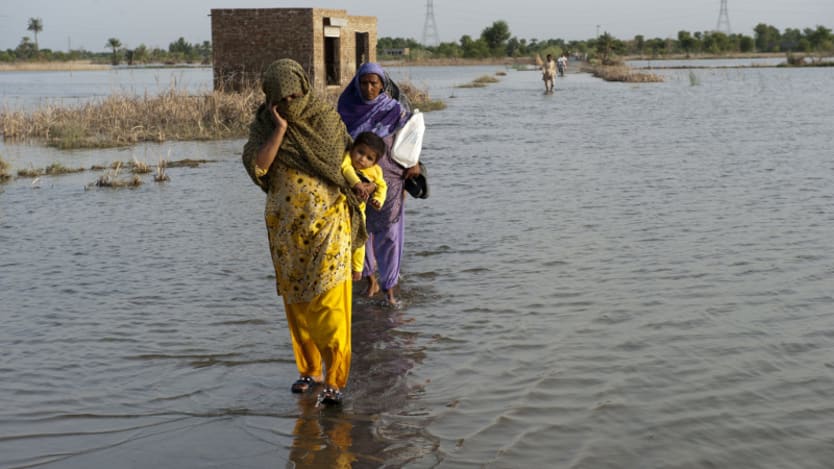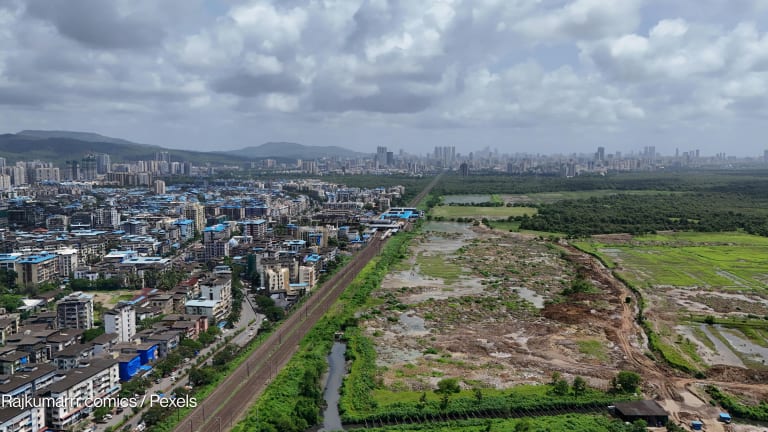
CANBERRA — Climate change is a more important driver of migration than income and political freedom at origin countries combined, and that figure may even be underestimated, a leading researcher on the interplay between climate and migration has told Devex.
Combining migration flows between 198 origin countries and 16 Organisation for Economic Co-operation and Development destination countries across 35 years with significant weather and temperature data, the findings of a collaborative study between Dennis Wesselbaum, economics researcher at the Otago Business School, and Amelia Aburn, from Victoria University of Wellington, provided evidence for climate migration’s impact — and the reality of climate refugees.
But their findings are just the tip of the iceberg.
Speaking to Devex at the 2018 Australasia Agricultural and Resource Economic Society conference held in Adelaide last month, Wesselbaum explained that the true impact of climate on the world’s movement is underplayed by poor data. He called for more investment in quality research and said governments need to better prepare for the political implications of a doubling or more of global migration.
Where climate fits in migration priorities
A variety of sources contributed to the dataset analyzed by Wesselbaum and Aburn as the basis for looking at migration flows between origin and destination countries — including data from the United Nations and OECD. But to understand causes, influences outside of the data need to be determined — including political instability, income at the destination country acting as a pull for migrants, and environmental factors.
“We bunched together the data and crunch numbers to look at various driving forces,” Wesselbaum explained. “The wage gap, distance between countries which is a proxy for how costly it is to migrate from one country to another, policy variables, and then on top we add climate change variables, such as temperature and weather-related disasters.”
This approach enabled Wesselbaum and Aburn to see the growing impact of climate, currently the third largest overall reason for migration.
“To put it into perspective, the wage gap is still the most important factor followed by cost and then climate,” Wesselbaum said.
See more related topics:
► Melanesian nations question global responses to climate change
► Q&A: 'The climate challenge is a development problem. A major development problem.'
► Opinion: Extreme weather heightens urgency for climate action, and everyone has a role to play
While these outside forces — wages opportunities and cost to migrate to destination countries — are leading factors of migration, climate is the strongest force within origin countries. The conclusion, and the other evidence available, suggests that climate change will increasingly have strong effect on less-developed country, particularly in countries that don’t have good social security, and limited mobility within their country.
The analysis to date has been simply statistical in nature, not speaking directly with migrants to understand the individual cause and effect. And this is one of the many data gaps that Wesselbaum said still needed to be filled.
“Measuring migration is very tough,” he said. “There are official numbers, but then there are also unofficial numbers. In our data, we are not covering migration within countries and we do not know if there is return migration. That is very hard to measure. And then there is the issue of data quality across countries.”
Despite there already being strong evidence linking climate related events to migration, Wesselbaum believes that poor migration data means the effects are being underestimated — and with better data, it would show an even stronger correlation between the two.
How can the research be used?
While there is still much work to be done to improve data and enable a better understanding of migration, the data is beginning to be used to conduct preliminary modelling of the impact rising temperatures will have on origin and destination countries.
“The question of forecasting and projecting population movements, factoring impact of changing climate or weather events, is something that we can do,” Wesselbaum said. “I have done simple, preliminary work. But in a scenario in which temperatures will rise to 1.5 degrees Celsius, the results suggested about doubling of overall migration.”
The political and policy impacts are profound.
Within origin countries, Wesselbaum said research has shown that temperature shocks lead to a declining gross domestic product as well as increased disease, water scarcity, and conflict.
“In India, heat waves will see temperatures rise to 40-50 degrees Celsius,” he said. “And this is predicted to result in loss of lives.”
And this also leads to an increasing impact in destination countries. But despite the research having serious impact for policy makers and governments, Wesselbaum is only aware of the New Zealand government seriously discussing and considering the impact of climate refugees at the policy level.
Calling for action
“We need, now, to prepare rather than let things happen and respond quickly after the fact,” Wesselbaum said.
“I have a very long wish list of things that need to be done. In 2018, we still have people like the United States President [Donald Trump] and former Australian Prime Minister [Tony Abbott] saying climate change is not real or a hoax. Despite some researchers dedicating their lives to climate change and the effects of climate change, we still have to deal with the deniers.”
The frustration for Wesselbaum is magnified by the fact that designing, debating, and implementing policy can lead a lag of years.
“Without a doubt, the issue of climate refugees is something that needs more attention,” he said. “We need to have the discussion — there is no doubt in my mind that climate refugees will happen.”
And Wesselbaum will be using this research, and further research, to push for action. Starting with New Zealand.








